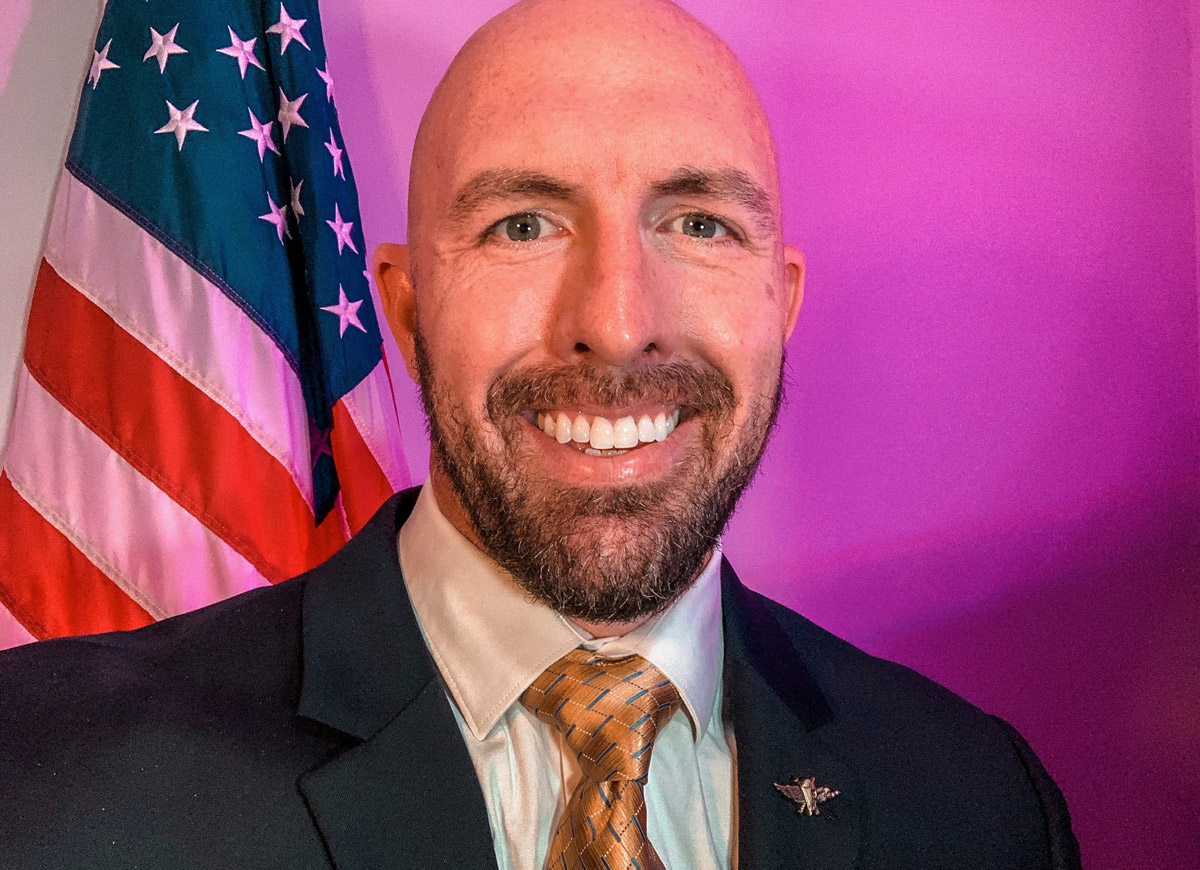
Photograph courtesy of Shane Hazel campaign
Incumbent Republican Senator David Perdue is up for re-election this year and has two challengers for his U.S. Senate seat: Libertarian Shane Hazel and Democrat Jon Ossoff. We sent the same 11 questions to all three candidates. Hazel’s responses are below. You can read Ossoff’s responses here. As of publication time, Perdue has not yet provided responses to our questions.
Responses have been edited for length and clarity.
If you’re elected, what does your first day in office look like?
Per Article 6, Section 3 of the Constitution, I am sworn in by oath to uphold the Constitution. Then I collect co-sponsors from all parties in the wars and bring our troops home immediately.
How would you rate the local and national response to the COVID-19 crisis? What should public officials have done differently, what have they done well, and what responses do you want to see in the future?
I would rate the government response to COVID-19 as abysmal. Officials, bureaucrats, and politicians all forgot their oath to uphold the Constitution. Per the Ninth Amendment, people of the United States have the right to conduct business, travel, trade, and be left alone. Per the First Amendment, we have the right to assemble to redress the government to practice our faith. All levels of government across this country decided they knew better and betrayed their oath. They decided our rights were only government permissions, and they pulled off the largest power grab and wealth transfer from the middle class to the elite the world has ever seen.
What has the pandemic taught you about yourself?
If the pandemic has taught me anything, it has shown me some holes in my own emergency preparation.
Before a vaccine becomes widely available, should Americans be afforded another stimulus check? If so, for how much and who should be eligible to receive it?
For the Constitution, there is absolutely zero power for the federal government to stimulate the economy through the issue of debt and Fiat currency.
Hundreds of thousands of Georgians could face eviction due to the economic hardships spurred by the pandemic, and many of those residents are relying on government-imposed eviction moratoriums to keep them at home for now. But once those protections expire, people will still owe rent. What recourse do they have? And what protections should landlords have for cases of delinquent renters? Should landlord and tenant laws be changed to adapt to the COVID-19 era?
Economic hardships were not spurred by the pandemic. Economic hardships were spurred by unconstitutional government lockdowns. Because the government took unconstitutional and illegal action by interfering in the economy, they have placed Americans on new ground. They bailed out the banks and the corporations with our money. Then they destroy the economy and our livelihoods. Now the banks in the state, via the sheriffs and the cops, will forcibly remove people from their homes all because the government declared them nonessential. This is not America. As a senator, this is one that I would make the banks and the government eat.
Do you think America and Georgia still struggle with systemic racism? What safeguards, if any, should be enacted to ensure people of color are not disproportionately afflicted by law enforcement, the criminal justice system, income inequality, and other factors?
Here is how we fix the broken criminal justice system:
- End the war on drugs
- End qualified immunity
- End police militarization
- End civil asset forfeiture
- Release all nonviolent criminals
- Define “crime” as murder, rape, assault, kidnapping, coercion, theft, robbery, vandalism, and fraud
- Harbor police officers at the precinct where they respond to those violent crimes listed above, as firefighters do for fires
- Lastly, we stop making criminals out of peaceful people
As public protests have broken out in Georgia and around the nation—especially over conflicts between police and people of color—do you believe the federal government should play a role in quelling local tensions? If so, when do you believe it is appropriate to dispatch federal law enforcement or military personnel, and why?
The violent protest within the states, per the 10th Amendment, are the states to deal with. Per Article 1, Section 8 of the Constitution, the federal government is only allowed to respond during times of insurrection and invasion, of which this is neither. These protests are a response to a post-Constitutional, lawless, and chaotic government that has forgotten its place in our society.
What are the most pressing issues facing the state/nation on the healthcare front? Should Medicaid be expanded? What are your thoughts on the push for Medicare for All? What steps should be taken to help Georgia’s maternal mortality crisis?
For the Constitution, there is zero delegated authority for the federal government in matters of healthcare. Per the 10th Amendment and the Ninth Amendment, those powers and rights do you want to the people. Furthermore, as a marine combat vet, I can tell you that the VA system is single-payer system [that] can’t take care of less than 1 percent of the population.
The COVID-19 pandemic has further exposed many weaknesses in Georgia’s healthcare system, particularly in rural Georgia. What can be done to fix the problems?
First of all, get all the federal bureaucracy out of the way. Next, Georgians will have to demand the state removes themselves from the healthcare market. Then, we allow the free market and free people to work on these problems without force and coercion. We are bureaucrats and politicians [and] pick the winners and losers where the stakes are life and death. Lastly, we promote charity. So the needy receive care through the consent of the giving.
There’s been fierce debate, especially since the passing of Justice Ruth Bader Ginsberg, regarding term limits in the Supreme Court. Are lifelong term limits sustainable for a high-functioning justice system? Are reforms needed? Why or why not?
Per Article 3, there are no lifetime appointments to the Supreme Court. Justices, per Article 3 of the Constitution, sit on good behavior. We don’t need reform; we need to practice the Constitution and remove those justices for bad behavior.
Where do you stand on the president’s nomination of Judge Amy Coney Barrett to the Supreme Court? What should the confirmation process look like in this and/or future nominations, and what are your thoughts on expanding—or “packing”—the court?
[The] president has the delegated authority to nominate a justice to the Supreme Court so that the Senate [may] accept or reject that nomination. I would think it extremely unwise to add any more would-be oligarchs in black robes legislating from the bench to the Supreme Court.
Read all of our 2020 candidate questionnaires













